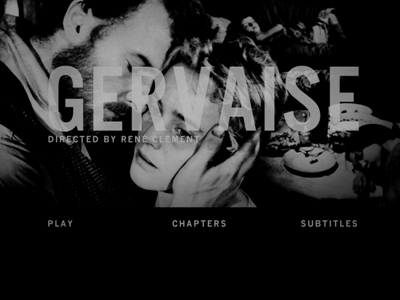
Réne Clément's 1956 historical drama Gervaise is an adaptation of Emile Zola's L'assommoir
As Gervaise herself tells us in her hopeful opening narrative, she is the girl who shouldn't have expected very much. At the start of the picture, which takes place in the late 1800s, she is living with her common-law husband Lantier (Armand Mestral), who has taken her on despite her limp and given her two boys in the time they have been together. Too bad for her that Lantier is the kind of man no female deserves, and pretty soon he runs off with a loose woman who lives across the street. Gervaise's anger leads to her having a knockdown drag-out fight with that strumpet's sister, Virginie (Suzy Delair). Despite taking place in a giant public laundromat, it's a pretty dirty scuffle, ending with Virginie's bare ass being spanked with a paddle. The indignity is one she promises never to forget.

With Lantier out of the way, things start looking up for Gervaise. She marries a kindly roofer, Henri Coupeau (Francois Périer), despite the protests of his family. They have a daughter together, Nana (Chantal Gozzi), and they make plans for Gervaise to open her own launderette. This dream is nearly scuttled when Coupeau falls off a roof and Gervaise's insisting on taking care of him herself leaves them broke. The kindly blacksmith Goujet (Jacques Harden) loans her the downpayment for her lease, revealing his buried love for Gervaise and sparking an unacknowledged jealousy in her husband in the process. Once again things are looking up for Gervaise.
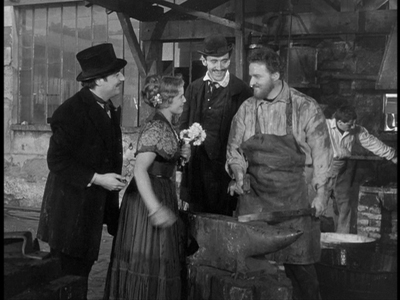
Of course, you can only look up so long before the sun burns your eyes, and that's when the blindside comes. Gervaise is one of those up-and-down melodramas where every step up the ladder the protagonist takes is followed by her being knocked back two more, all the way to the bottom and down to hell if the earth would just comply and open up. It's the sort of story that, when done poorly, compels the audience to throw up its hands and cry, "Enough! I give up!" When done well, however, as Gervaise most certainly is, it makes co-dependents of us all. Yes, Gervaise, we'll watch you get your hopes up, and we'll wait with wetted lips for them to get dashed on the rocks. Especially because we know each failure will be bigger than the last.
I think an essential component of any such movie succeeding is the strength of its lead. In this case, Maria Schell imbues Gervaise with a natural warmth and kindness that somehow makes us root for her even as we slowly begin to realize that she's not really that innocent of a victim. Or maybe "innocent" is the wrong word. It's more that she is less a victim of opportunistic men then she is her own bad choices. Whatever societal forces may be informing her misguided decisions, and the lack of education that leaves her without other tools, it becomes increasingly hard to reconcile the Gervaise that fought back against Virginie and whooped her ass with the Gervaise who allows a besotted Coupeau to let Lantier move in with them, and who is then manipulated in jumping between the beds of both men. We know she is capable of better, but she has latched onto bad luck as her own addiction. It's like she wouldn't know what to do without it. With her kind face and clear, expressive eyes, Schell reminds me a lot of Liv Ullmann, which is probably a major reason why I was drawn to her. She is an excellent actress in her own right, though, and later played both the love interest in Luchino Visconti's marvelous Le notti bianche and the immigrant frontier wife in Anthony Mann's version of Cimarron.
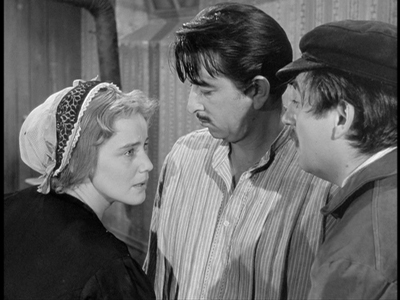
Symbolically, the blacksmith Goujet is Gervaise's conscience. He never fails to see what is really going on, and when she later tries to lie to him, she can't really do it. He also serves as the example of social change, and when he is sent to jail for organizing a strike to protest unfair wages, that's when things really go south for Gervaise. Without him there watching, she has no one to help her pick her drunken husband up off the street or ward off Virginie's machinations. As in Carné's La jour sa lève, work is what sets a man free. When Coupeau stops working, he disappears inside a wine bottle, whereas Goujet's taking Gervaise's eldest, Etienne (Christian Férez), under his wing offers the boy a way out of the squalor. Jacques Harden lends Goujet a rugged earthiness that would have made him right at home as the love interest in one of Douglas Sirk's movies from the same period. The scene when Gervaise goes to see him and Etienne off, and he doesn't see her standing there on the train platform--or quite possibly ignores her--is one of the most heartbreaking in the movie.

Its rival for saddest scene is the very end of the picture, when we see poor Nana heading on the road to ruin herself. René Clément had already proved himself an expert at portraying childish behavior and the hidden meanings behind it in Forbidden Games when he made Gervaise, and he turns Nana into a cautionary element that is integral to the narrative. If Etienne is an example of how a child can escape his surroundings with a little guidance, the blank sponge that is Nana soaks up all the nastiness, all the dirty laundry, that fills Gervaise's shop. Left to her own devices, the unbathed child wraps a ribbon in her hair and runs to an eager group of young boys. They turn to chase her the way a flock of birds shifts flight in mid-air. It's a creepy image all on its own, but knowing where that chase will lead her, it's all the more chilling. Nana is the star of another of Zola's novels

Observing behavior that is meant to remain unseen has always been Clément's strong suit. Be it the cons of Alain Delon in Purple Noon

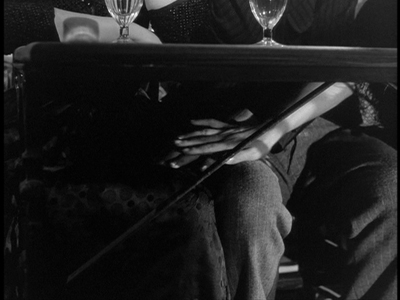
The same attention to detail is paid to all of Gervaise, and the director and his crew recreate 19th-century France with gritty accuracy. One of the most impressively realized sequences takes place on Gervaise and Coupeau's wedding day, when the working-class wedding party goes to the Louvre, many of them for their first and only time. They tour the museum, looking at the paintings, laughing at the ones with nudity, tracking mud through the institution's corridors. Clément shows us both the expanse of the galleries, but also the tight formation of the group, including ducking down to check out that dirty footwear.

Alongside Schell's charisma, such exacting focus on getting every inch of the movie right is crucial to our accepting the emotional histrionics of Gervaise. The movie never feels like a put-on, and it's most certainly never manipulative. By creating a believable world, René Clément also makes the story believable, even when we don't want to believe that our heroine is going to go the wrong way again. Real life is full of mistakes, and a movie's main character is allowed to make them, but the storytellers are not.

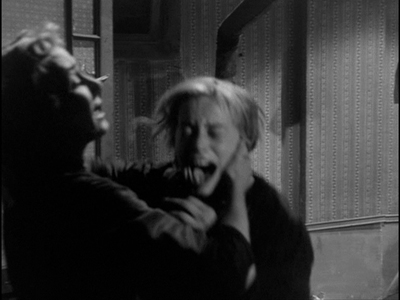
This disc was a Christmas present from my good friend and regular editor, the writer Maryanne Snell. What can I say, it was an Essential Art House Holiday. Many thanks, Maryanne!

No comments:
Post a Comment